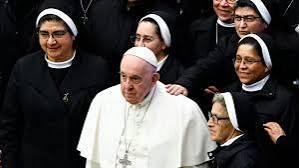Historic First: Women Vote at Global Catholic Synod
For the first time in history, women participated as voters at a synod, a significant global assembly of Catholics, held at the Vatican. This momentous occasion marks a pivotal shift in the Church's approach to inclusivity and representation, reflecting broader societal changes regarding women's roles in religious and public life.
The synod, titled "For a Synodal Church: Communion, Participation, and Mission," brought together bishops, clergy, and laity from around the world to discuss the future direction of the Catholic Church. The inclusion of women as voting members highlights an important step toward gender equality within the Church's decision-making processes.
Among the participants was a student from St. Joseph's University in Philadelphia, who shared her thoughts on this historic moment. She expressed excitement about being part of a groundbreaking event that could reshape the Church's future. “Voting at the synod made me feel like my voice mattered,†she stated, emphasizing the importance of women's perspectives in discussions about faith and community.
The decision to allow women to vote at the synod was part of a broader effort initiated by Pope Francis to promote a more inclusive Church. Over the past few years, the Pope has called for greater participation from laypeople, particularly women, in Church governance. This synod was viewed as a platform to address pressing issues such as clericalism, transparency, and the role of women in the Church.
The involvement of women at the synod is particularly significant given the historical context of the Catholic Church, which has often been criticized for its patriarchal structure. Many women have long advocated for a greater role in Church leadership and decision-making, and this synod represents a breakthrough in these ongoing efforts.
The student from St. Joseph's University remarked on the diverse backgrounds of the women participating in the synod. “It was inspiring to see women from different cultures and experiences come together to share their insights,†she noted. This diversity not only enriches the discussions but also fosters a sense of global solidarity among Catholic women.
The synod also addressed critical issues facing the Church today, such as youth engagement, the challenges of modern secularism, and the need for pastoral care that resonates with contemporary believers. The student highlighted that discussions on these topics were enriched by the perspectives of women, who often bring unique insights into community dynamics and social issues.
As the synod progressed, many participants expressed hope that this change would lead to more significant reforms within the Church. The student echoed this sentiment, stating, “I believe this is just the beginning. Women must continue to advocate for their place in the Church and society.â€
The decision to include women as voters at the synod is a historic milestone, signaling a potential shift in the Church's governance and its approach to gender equality. It reflects a growing recognition of the invaluable contributions that women can make to the Church's mission and vision. As the synod concludes, many will be watching closely to see how these changes unfold in the future, hoping for a more inclusive and representative Church that embraces the voices of all its members.


